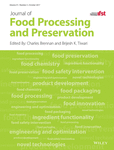Contribution of Mixed Starter Cultures to Flavor Profile of Suanyu – A Traditional Chinese Low-Salt Fermented Whole Fish
Abstract
The effect of mixed starter cultures isolated from Suanyu on flavor compounds development has been researched. Microorganism, pH, TA, sugars, nonvolatile organic acids and volatile compounds were analyzed in Suanyu with or without starters. In inoculated samples, a higher growth of lactic acid bacteria (LAB) and a declining rate of pH were determined when compared with the controlled samples. Besides, higher levels of volatile compounds were detected in inoculated Suanyu (19342.47, 19852.74 × 106 area units for PS) than those in controlled samples. During the process, aldehydes, acids, alcohols, esters and ketones were formed and increased continuously. Especially in Suanyu with PS, higher levels of ethanol (6973.8, 6549.9 × 106 area units) and acetic acid (2116.8, 2471.1 × 106 area units) were detected, which could produce unique wine flavor and moderate acid taste. Furthermore, high content of hexanal was generated through the addition of PS, which could contribute to a green grass odor.
Practical Applications
In this study, microorganism, pH, TA, sugars, nonvolatile organic acids and volatile compounds were analyzed in Suanyu with autochthonous starter cultures. The results showed that the generative stability of Suanyu can be assured and the product quality can be advanced by adding autochthonous starter cultures compared with that of noninoculated samples. There is a need to add modern processing technology such as microbial fermentation of the fermentation process to achieve effective control to ensure product flavor and product quality stability. In this study, autochthonous starter cultures isolated from Suanyu, which were propitious to the demand of industrialization. Besides, once the research is applied in the industrialized production, and considerable social and economic benefits can be obtained. Therefore, this study has a good prospect in application.




